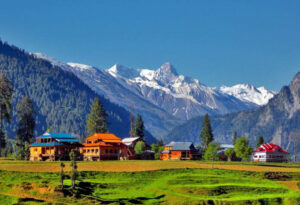 Qazi Mizan: Azad Jammu and Kashmir is an administrative region of Pakistan located at the topmost part of the country. This is a land blessed with beautiful and vast fertile green mountainous valleys making it one of the most naturally blessed places in the world. It is for this reason alone that many Pakistanis choose to spend their holiday trips in Kashmir.
Qazi Mizan: Azad Jammu and Kashmir is an administrative region of Pakistan located at the topmost part of the country. This is a land blessed with beautiful and vast fertile green mountainous valleys making it one of the most naturally blessed places in the world. It is for this reason alone that many Pakistanis choose to spend their holiday trips in Kashmir.
Tourism is an often-overlooked important variable when discussing regional progress and the economy. The tourism industry creates many jobs for locals, becomes a source of revenue for the nation attracts foreigners, and can also serve as a tool for exerting soft power. More specifically tourism is an untapped resource within Pakistan that holds many pros making it a worthy investment. Not only will tourism in Kashmir create more jobs for local Kashmiris but it will bring more money and infrastructure development into the region resulting in a better quality of life. On a national level more foreign tourism would mean more much-needed dollars pouring into the economy and acting as a source of revenue improving Pakistan’s GDP growth. Most people would assume the advantages end here however tourism holds far more value for Pakistan in the form of soft power projection. By attracting foreign tourists Pakistan would be able to improve its global image by sharing beauty and culture, additionally, Pakistan would be better able to expose foreigners to the Issue of Indian-occupied Kashmir issue as many potential tourist destinations are close to LOC. Overall the main advantages discussed are reason enough for Pakistan to start investing more in sustainable tourism development. To achieve sustainable development of tourism within Kashmir Pakistan would need to focus on a few key factors. First up is infrastructure development as ease of accessibility is one of the most important factors in attracting tourism. Azad Jammu and Kashmir as it now host many popular tourism sites where infrastructure development is almost non-existent and only hard-core hikers tend to visit. In order to achieve sustainable tourism, general accessibility should become suitable for the majority of both domestic and foreign tourists. Infrastructure development includes properly paved roads, strong bridges, internet & mobile signals availability, high standard tourist hotels, chair lifts, etc (Especially after recent floods damage all over the country which shows the need for long-term infrastructure planning. Only when the average person gains access to a place can it experience sustainable growth. The next thing factor that needs work is long-term comprehensive tourism policies. Over the years many studies have been conducted regarding which policies are needed for promoting tourism and many governments have taken steps to implement them, however, the problem lies in the lack of long-term policies which do not get reversed with a change of government after every election. This lack of uncertainty and immature development is what causes many policies to fail or not have enough effect. Hence what is needed is a joint effort by Pakistan’s major political parties to create long-term tourism development policies and keep political interests out of this valuable nation-building industry (After all political party interests have no value in front of state interests). With infrastructure and government policy covered we must also take into consideration the importance of private investment within the tourism industry. There is a limit to the number of services the government can provide, especially with a limited budget in Pakistan, where the gap can be filled via private investment by Pakistanis within businesses such as hotels, restaurants, recreational activities, etc., after all, sustainability in tourism also requires entertainment. As things stand many domestic tourists tend to avoid regular hotels due to the expectation of low-quality service, if this trend can be reversed via large-scale government training programs then perhaps the famed “Pakistani Hospitality” can be used as a slogan to attract foreign tourists at a sustainable rate. Another needed step to influence sustainable tourism in Kashmir lies in local government programs to preserve historical & cultural sites. Alongside creating more tourist sites, Pakistan will gain more attention from the academic community. And last but not least are coordinated efforts to use social media as a tourism promotion medium. Over the past few years successive governments have adopted the use of social media by attracting influencers and foreign bloggers, this needs to be upscale further with the addition of incentivizing local Pakistani bloggers as well.
All in all, tourism is a powerful tool, both for the economy and national soft power. In the context of Kashmir, Pakistan has tried professionally to fully embrace its tourism potential which being among the world’s most beautiful places can also become one of the world’s most visited places.





